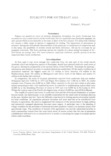Eucalypts for South-East Asia
Tropical agriculture research series : proceedings of a symposium on tropical agriculture researches
| ISSN | 03889386 |
|---|---|
| 書誌レコードID(総合目録DB) | AA00870529 |

本文フルテキスト
tars12-_153-161.pdf1.51 MB
Figures are quoted for areas of eucalypt plantations throughout the world. South-east Asia accounts for only a small fraction of the world total. For the equatorial zone Eucalyptus deglupta, the
only species which occurs naturally in the zone, is likely to be best adapted. For areas with a distinct dry season a wider range of species is suggested for testing. The importance of provenance is stressed. Among the silvicultural characteristics of the genus are its intolerance of competition and, in dry areas, the possibility of termite attack and boron deficiency. All can be overcome by appropriate
treatment. The faster-growing species are capable of a mean annual increment of 25-30m3/ha/an on average sites. For some purposes, especially fuelwood, specific gravity is no less important than volume production.
only species which occurs naturally in the zone, is likely to be best adapted. For areas with a distinct dry season a wider range of species is suggested for testing. The importance of provenance is stressed. Among the silvicultural characteristics of the genus are its intolerance of competition and, in dry areas, the possibility of termite attack and boron deficiency. All can be overcome by appropriate
treatment. The faster-growing species are capable of a mean annual increment of 25-30m3/ha/an on average sites. For some purposes, especially fuelwood, specific gravity is no less important than volume production.
| 刊行年月日 | |
|---|---|
| 作成者 | Richard L. WILLAN |
| 公開者 | Japan International Research Center for Agricultural Sciences |
| 巻 | 12 |
| 開始ページ | 153 |
| 終了ページ | 161 |
| 言語 | eng |
